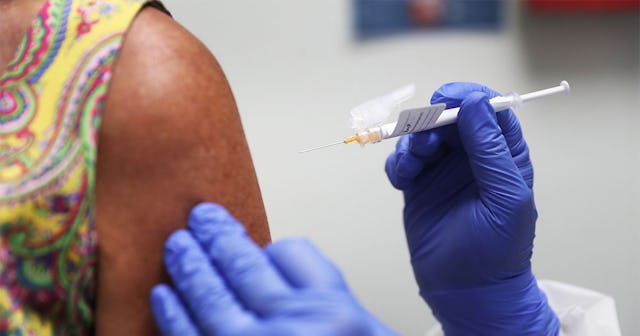Two-Thirds Of U.S. Voters Say They Won't Get The COVID-19 Vaccine Immediately

The majority of Americans plan on waiting to get a coronavirus vaccine instead of getting jabbed as soon as possible
Ever since the first cases of COVID-19 were identified this winter in Wuhan, China, researchers have been scrambling to develop an effective vaccine against the highly infectious deadly virus. However, now that we are closer to having one available, the majority of Americans are having major hesitations. According to a new USA TODAY/Suffolk poll, two-thirds of voters in America aren’t planning on getting the vaccine as soon as it becomes available — and one-quarter don’t plan on getting it at all.
The survey, which polled 1,000 voters, found that many Americans would decline the vaccine, “fueled by mistrust of the Trump administration’s push to speed up its development” in addition to simply being opposed to immunizations of any kind, according to USA TODAY. This could be a major issue as far as efficacy, as the majority of the population needs to get a vaccine in order to be effective.
“If you have 330 million doses of vaccine and nobody wants it, it accomplishes nothing. You’ve got to use the vaccine. It’s just as important as how effective the vaccine is,” Dr. David Salmon, a professor at the Bloomberg School of Public Health at Johns Hopkins University and an expert in global disease epidemiology and control, told the publication. “You probably need between 70 and 80 percent of the population to get immune in order to really control COVID. And when I say immune, I mean both get the vaccine and the vaccine worked for them.”
Specifically, the poll found that two-thirds of the 1,000 voters surveyed – 67 percent – won’t get the vaccine until others have tried it (44 percent), while 23 percent don’t want to get it regardless. The remaining one-third of people were divided, with 27 percent claiming they will get it ASAP, while 6 percent are undecided.
Various factors influenced the likelihood of being open to the vaccine. Age was one of them, with people 75 and older and younger than 24 the most likely to get it. Political affiliation also plays a role, with 86 percent of Democrats likely to get it at some point compared to just 61 percent of Republicans. Men and women were evenly split. White voters were the most likely to be first in line for the vaccine (31 percent) compared to just 17 percent of Hispanic voters and 15 percent of black voters.
Even if the majority of people get the vaccine, it won’t mean that social distancing will be a thing of the past. In fact, in an August interview with Bloomberg, Dr. Anthony Fauci, the nation’s leading infectious disease expert, explained that it likely won’t offer 100 percent protection against the virus, similar to the flu shot.
“That’s a good question,” Fauci answered when asked when life would get back to normal, adding that “it’s going to depend very much on what the percent or level of efficacy of the vaccine is.”
“If we don’t get a vaccine that is highly, highly, highly effective, even though it could still be a good vaccine, I think we would have to have some degree of attention to public health measures,” he continued.
Fauci also pointed out that immunity doesn’t happen overnight.
“It’s going to take a while to build up an accumulative amount of immunity, either induced by the vaccine or by natural infection, to get to the point where you really have a veil of protection over the community,” he said. “That’s not going to happen in the first couple of months of availability of vaccine. So we will not be able — we should not abandon public health measures even when we do get a vaccine.”
Information about COVID-19 is rapidly changing, and Scary Mommy is committed to providing the most recent data in our coverage. With news being updated so frequently, some of the information in this story may have changed after publication. For this reason, we are encouraging readers to use online resources from local public health departments, the Centers for Disease Control, and the World Health Organization to remain as informed as possible.